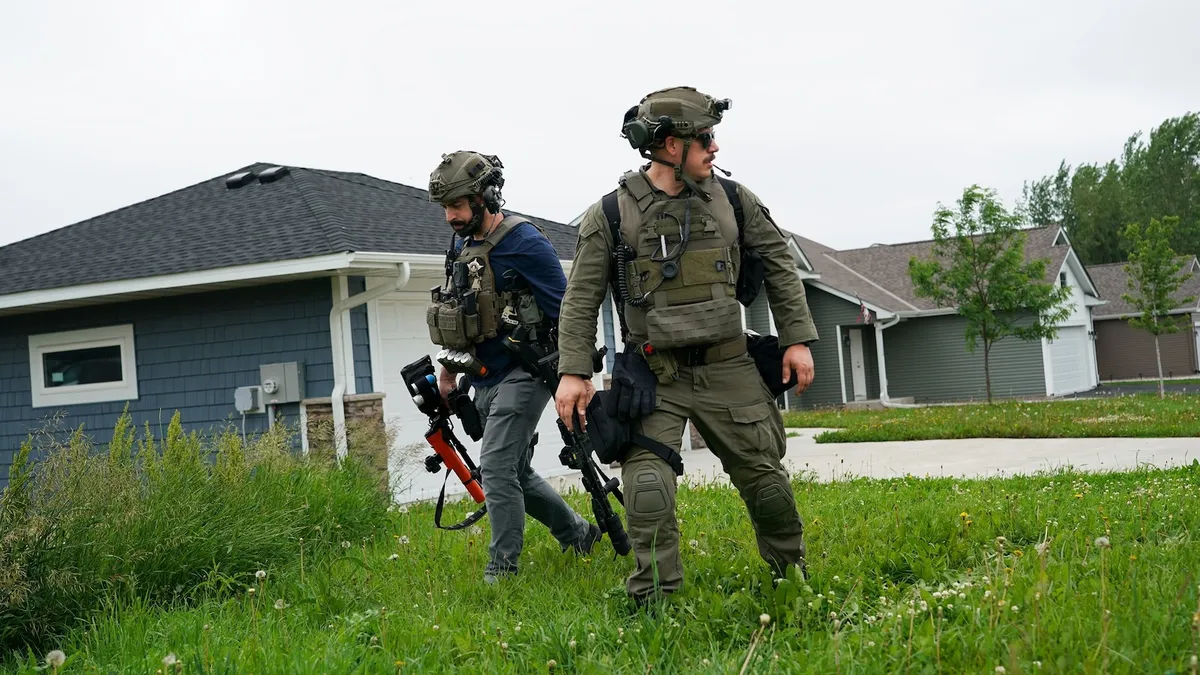
On a chilling Sunday night in Green Isle, Minnesota, Wendy Thomas was on the phone with her father when she noticed a suspicious figure in a nearby field. As she observed the individual approaching a culvert and squatting down, she exclaimed to her father, “Dad, that’s somebody.” Responding quickly, her father urged her to contact the authorities, leading to a sequence of events that culminated in the arrest of the suspected gunman, Vance Boelter.
Law enforcement had been actively searching for Boelter for approximately 43 hours prior to the sighting made by Thomas. He is accused of committing the horrific murder of Democratic Minnesota state Representative Melissa Hortman and her husband, Mark Hortman. In addition, Boelter allegedly wounded Democratic state Senator John Hoffman and his wife, Yvette, in what authorities describe as politically motivated assassinations. Acting U.S. Attorney for the District of Minnesota, Joseph Thompson, confirmed the details of the brutal attacks.
According to officials, Boelter reportedly arrived at the victims’ homes impersonating a police officer and donned a realistic-looking mask. This shocking act took place in the early hours of Saturday morning. Notably, two other lawmakers were spared during the night of the shootings. Investigators revealed that Boelter had been surveilling his victims, meticulously taking notes on their routines and living conditions.
During a search of a residence in north Minneapolis linked to Boelter, authorities uncovered a disturbing list of public officials, which included a notation under Melissa Hortman's name that read, “married Mark 2 children 11th term.” Additionally, another notebook contained meticulous details, including a note indicating, “Big house off golf course 2 ways in to watch from one spot.” These revelations paint a picture of a calculated stalker who viewed his victims as prey.
Vance Boelter is now facing a slew of serious charges, including federal offenses related to stalking and firearms, as well as state charges for first-degree murder. He made a preliminary appearance in federal court on Monday. Currently, the motive behind these tragic events is still under investigation.
In light of the violence, Minnesota state Senator Scott Dribble, who worked closely with Hortman, expressed his deep concern regarding the increasing divisiveness in political rhetoric, particularly among right-wing extremists. Dribble highlighted how recent years have seen a troubling trend of dehumanizing language used at the highest levels of government, which has led to a dangerous atmosphere.
Lieutenant Governor Peggy Flanagan echoed these sentiments, emphasizing the need for elected officials to engage in humanitarian efforts and work collaboratively across party lines during these challenging times. Flanagan stated that the message should focus on community support and mutual care rather than divisive rhetoric.
In a statement released on Monday, Minnesota Governor Tim Walz asserted that the path forward for the nation does not lie in hate or violence but rather in humility, grace, and compassion. His comments come amidst a backdrop of political tensions that have reached alarming levels.
On Tuesday, President Donald Trump notably refused to extend condolences to Governor Walz, stating, “I don't want to call him. I think the governor of Minnesota is so whacked out.” This response has drawn criticism, with Walz's spokesperson emphasizing that the focus should remain on the victims and their families, rather than political figures.
Following the incident, Senate Democrats and Republicans convened for a briefing regarding member safety, particularly in light of the revelation that several Congress members were included on Boelter's alleged target list. Senator Tina Smith, who was identified as a potential target, underscored the importance of maintaining discretion regarding safety measures to ensure the well-being of lawmakers.
Senate Minority Leader Chuck Schumer remarked on the urgent need for increased funding to enhance security measures for elected officials, citing a significant rise in violence and threats against members of Congress. He emphasized the necessity for more protection and resources to safeguard lawmakers against this alarming trend.
This tragic event has raised profound questions about the safety and security of elected officials in Minnesota and across the United States, highlighting the urgent need for a shift in the political landscape toward a more compassionate and unified dialogue.